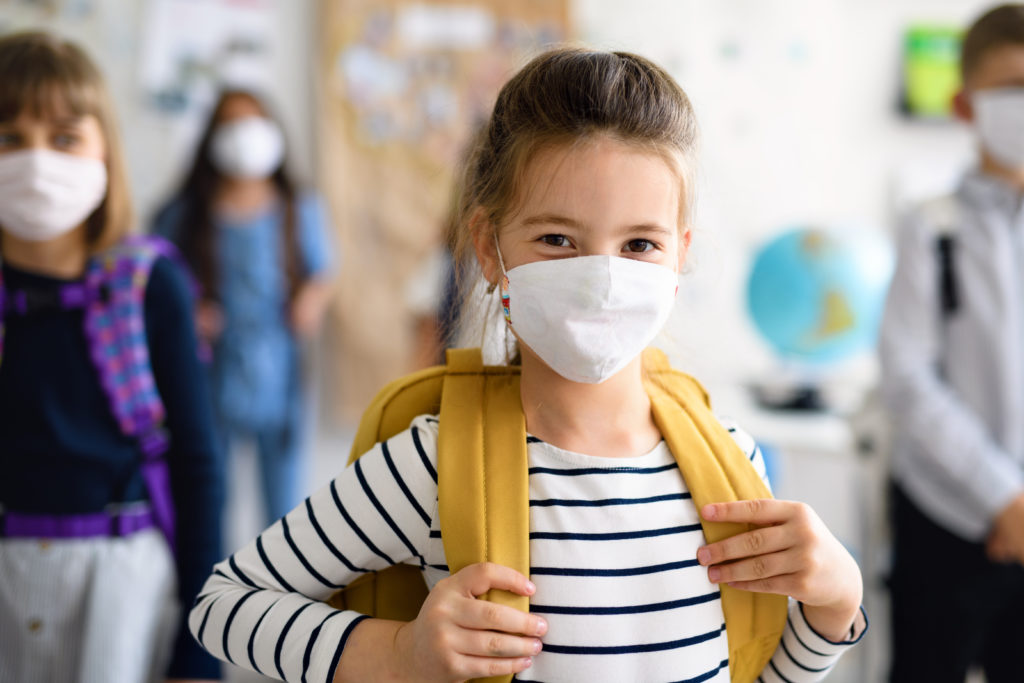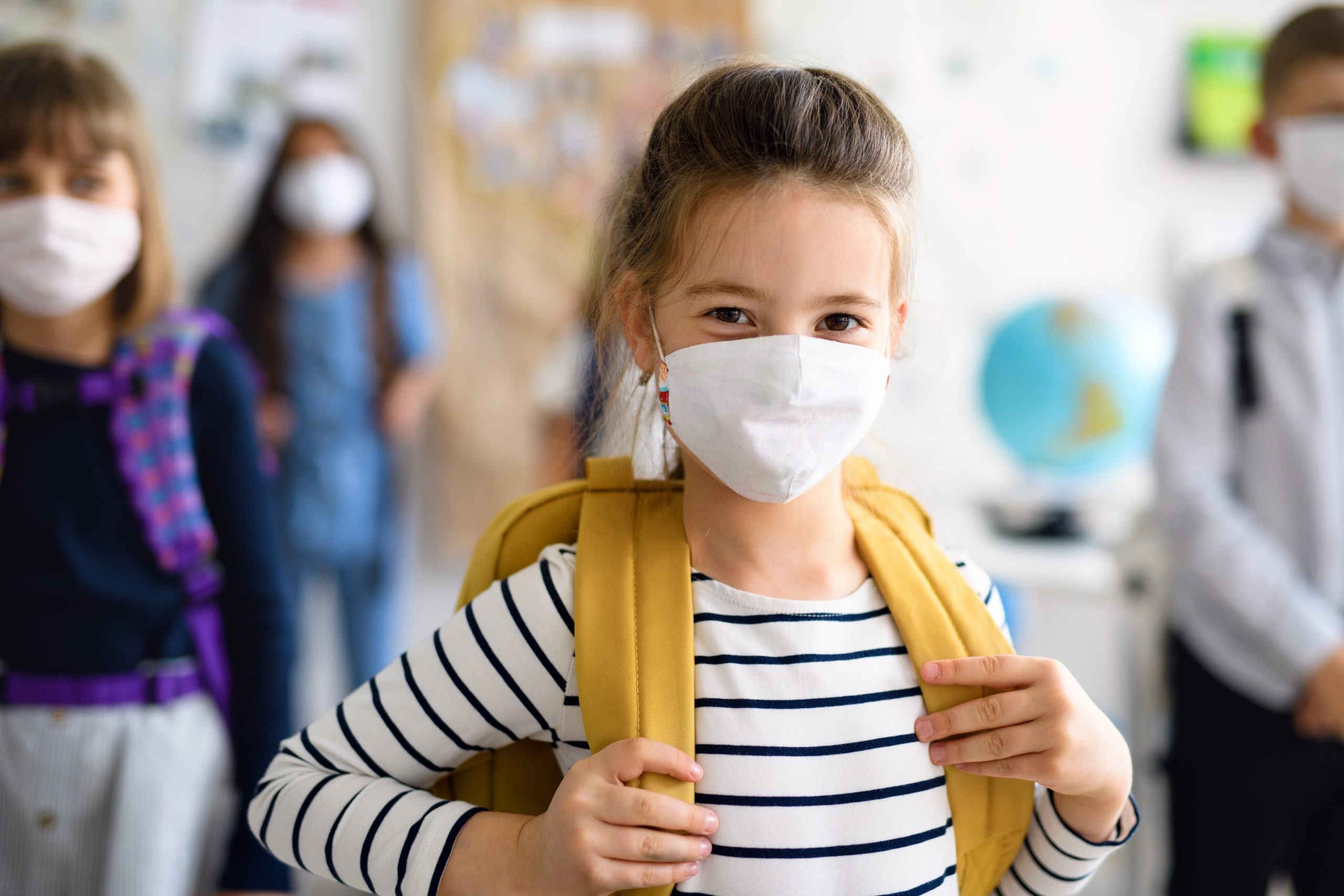
As parents, we always worry about the health of our children. This past year and the COVID-19 pandemic have brought about new concerns. As a doctor who cares about the safety of our patients, here are our tips for keeping your kids healthy during these unusual times.
Masks
We all know the importance of wearing masks, but children face unique challenges. Ensure the mask fits properly, closes firmly over the bridge of the nose and isn’t too loose down around the jaw or chin. Remind them to avoid touching and pulling on their masks. And don’t forget to give their ears a break—headbands and masks straps can be a lifesaver from the constant rubbing of the ear loops. Be sure masks are washed or changed frequently to prevent a build-up of germs. Keeping a couple extra masks is always a good idea, too!
Handwashing
The importance of handwashing is nothing new, but is especially important to prevent the spread of coronavirus. Children should wash their hands:
- After blowing their nose, coughing or sneezing
- After handling their face mask
- After leaving a public place
- After touching animals or pets
- After using the restroom
- Before and after eating food
- Before touching their face
Alcohol-based sanitizer and wipes are a good alternative when soap and water is not available. Ensure the product is at least 60 percent alcohol.
Sleep
Sleep is crucial in keeping the body healthy. During rest our bodies are able to focus on fighting off infections, repairing damage and growing. Children do need more sleep than adults, according to the American Academy of Pediatrics:
Children ages 3–5 need 10–13 hours of sleep per day
Children ages 6–12 need 9–12 hours of sleep per day
Children ages 13–18 need 8–10 hours of sleep per day
A restful environment is important for successful sleep; the room should be dark, cool, and quiet, and blue light (from TV, computer, phones, or tablets) should be eliminated an hour before bedtime.
Nutrition and Exercise
A well-balanced diet with daily exercise is important for body weight, but also our immune system health. Due to the pandemic activities have been limited and poor food choices have increased. Set a good example for your children by moving more and choosing more nutrition foods. Involve the whole family in games or walks. Plan recipes and weekly menus together- children are much more inclined to eat healthy foods when they’ve had a hand in preparing them. Focus on fruits and vegetables, lean proteins and healthy fats. Set a schedule for meal and snack times.
Some healthy snack ideas:
Strawberries with low-fat Greek yogurt
Cottage cheese with pineapples
Lean deli turkey wrapped around a string cheese
Hydration
We all know the importance of staying hydrated and drinking water. We are approaching summertime here in San Antonio, and our fluid requirements increase. The unfortunate thing is most water fountains are turned off or inaccessible due to the pandemic and social distancing guidelines. It is important that our children have access to water or other sugar-free fluids. The easiest answer is to have them carry their own water with them. To ensure the safest drinking water you should choose bottles that are intended to be reusable and are BPA free.
Don’t be afraid to reach out to your family physician if you or your children are struggling with any of these issues. Being a parent is challenging, being a parent in pandemic is even more difficult. We’re here to help!
Charter Moms Chats
Watch Tamyra Rogers, M.D., of Dr. Rogers Centers speak with Inga Cotton on Charter Moms Chats on April 16, 2021 at 4:00 PM Central live on Facebook and YouTube.
Tamyra Rogers, M.D., of Dr. Rogers Centers, arrived in San Antonio, Texas, in 2001 after years of treating obesity, first as chief resident at the University of Oklahoma Health Sciences Center, then as director of the Metabolic Clinic for Tuba City Indian Medical Center in Tuba City, Arizona.
At the Tuba City Indian Medical Center, she helped build the first wellness center for the Navajo nation to fight the epidemic of diabetes. As chair of the diabetic program, she adopted a hybrid model of treating diabetes using holistic approaches from the Navajo tradition in tandem with Western medicine.
Dr. Tamyra Rogers was recently named Female Physician of the Year by the Bexar County Medical Society. Dr. Rogers is a practicing member of the American Association of Bariatric Physicians. At the national level, the Consumer Research Council named her one of America’s Top Physicians in Internal Medicine and Bariatrics.Dr. Rogers has been a guest speaker on subjects ranging from micronutrients to the care of surgical weight-loss patients at the American Society of Bariatric Physicians Annual Conference. She has also been a keynote speaker for Women in Medicine Bexar County Society.
Before completing her medical degree at the University of Texas Health Science Center in San Antonio, Texas. Dr. Rogers completed her undergraduate degree at the University of Oklahoma, where she was well known for her competitive skills in basketball. Today, the university honors her with an endowment scholarship in her name to memorialize her outstanding achievements on the court. The NCAA has also recognized her with a Silver Anniversary Award; she is the first female athlete to be named at the University of Oklahoma.
Dr. Rogers is known for exceptional drive and commitment that she now channels to her fight against the obesity epidemic. She is steadfast in her commitment to preventative medicine and her patients.
Read More About Health and Safety
- “Spell Your Name At-Home Fitness Activity—with a Plank Challenge!”, Aicha Mosha, San Antonio Charter Moms, March 15, 2021
- “Cutie Charcuterie with Dave Terrazas,” San Antonio Charter Moms, February 12, 2021
- “COVID-19 Virtual Forum: Col. Dr. Heather Yun Answers Questions About Vaccines,” San Antonio Charter Moms, February 3, 2021
- “Spooky Snack Board in the Foodie Classroom with Dave Terrazas,” San Antonio Charter Moms, October 30, 2020
- “What Happened to Sleep Schedules?”, Emily Daniels and Lindsay Durham, San Antonio Charter Moms, July 27, 2020
- “Coin Flip Fitness,” Steven Ramirez, San Antonio Charter Moms, July 23, 2020
- “Cookin’ Smart in the Foodie Classroom with Dave Terrazas,” San Antonio Charter Moms, July 3, 2020
